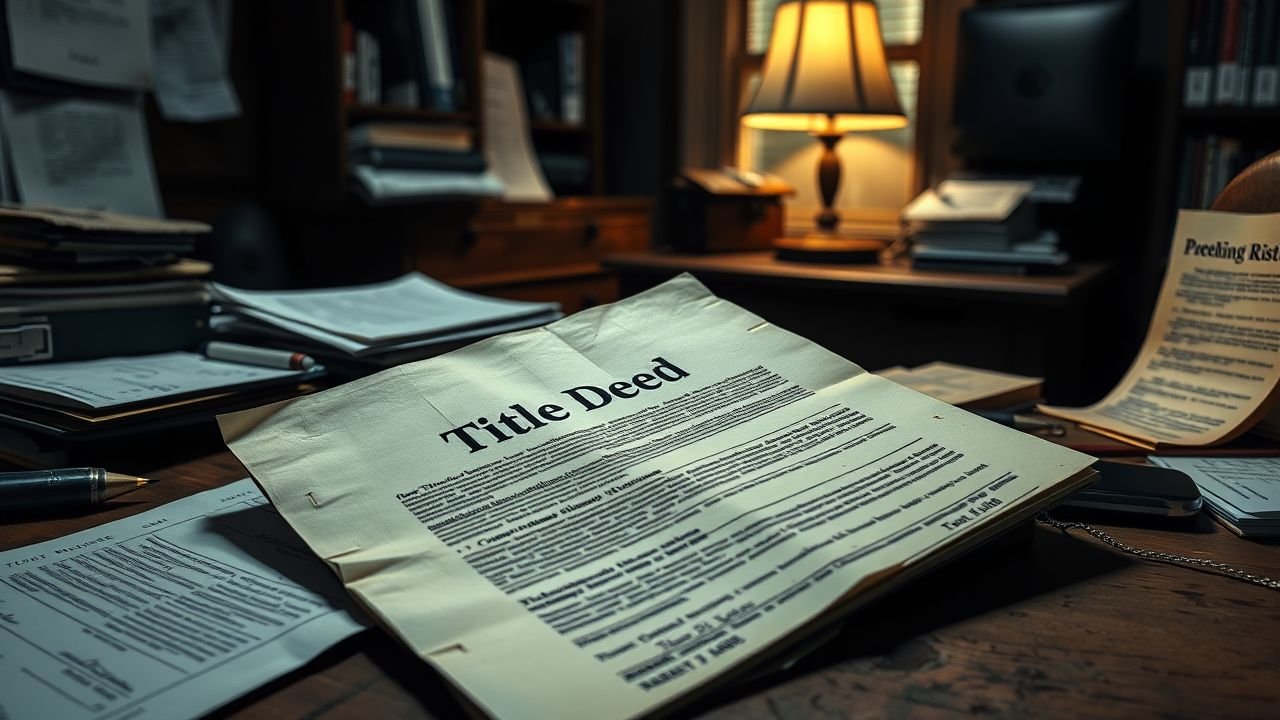Thinking about investing in real estate but feel unsure about the legal stuff? You’re not alone. Many investors worry about real estate investment laws like zoning regulations and tenant rights.
These rules can be confusing and might slow down your plans. 3
Did you know that understanding real estate investment laws can help you avoid big mistakes? In this blog, you’ll learn about property taxes, fair housing laws, and how to do your due diligence.
We’ll show you how to protect your investments and stay compliant. Ready to make smart real estate moves? 1
Key Takeaways
- Know Key Laws: Learn important laws like TILA for loan terms and RESPA for settlement costs to handle financing right.
- State Rules Matter: Follow specific state laws, such as Florida’s homestead exemptions and California’s Proposition 13 to protect your property.
- Do Your Homework: Perform title searches and environmental checks under laws like CERCLA to avoid hidden problems.
- Use Clear Contracts: Create simple, clear contracts and consider using LLCs to protect your investments and limit risks.
- Maximize Tax Benefits: Take advantage of tax options like 1031 exchanges and understand property taxes to keep more of your earnings.

Overview of Real Estate Laws

Real estate laws can feel like a maze, but don’t worry—you’ll navigate them like a pro. From owning property to making sales, knowing the rules keeps your investments solid.
Property Rights and Interests
Property rights define what you can do with your property. You have the right to possess, control, and enjoy your home. Ownership includes the ability to exclude others and decide how to use your land.
Clear property ownership prevents fraud and keeps the market fair. 1 Title deeds are essential documents that prove your ownership and help in transferring property.
Understanding property interests is also crucial. Interests cover everything from lease agreements to mortgages. When you buy or sell real estate, legal titles and deeds make the process smooth.
Environmental assessments ensure your property meets all regulations. 2 Knowing your property rights helps you protect your investment and avoid legal issues.
Sales and Acquisitions
Transitioning from understanding your property rights, let’s explore the details of sales and acquisitions. Clear contracts are essential in every real estate transaction. Your purchase agreements should outline all terms and conditions to avoid misunderstandings.
Conducting due diligence ensures you verify the land title and check for any hidden issues. Disclosure requirements mandate that sellers reveal important information about the property, protecting you from future surprises. 3
Title insurance protects your investment by covering any post-purchase title problems. Engaging a real estate attorney helps you manage contract law and ensures compliance with zoning regulations and environmental laws.
Regular audits of your real estate portfolio can identify legal risks and keep your investments secure.
“The right legal guidance can save you from costly mistakes.”
Key Legal Considerations for Real Estate Investors

When you invest in real estate, knowing the laws can save you big time. These important points will help you make smart and safe decisions.
Zoning Regulations
Zoning regulations split land into residential, commercial, industrial, and agricultural zones. 4 Understanding zoning laws helps you make smart real estate investments and manage property ownership.
Conditional use permits (CUPs) let you use land in ways not usually allowed, boosting your investment potential. Local governments update zoning ordinances regularly, so keep up with the changes. 4 Engage with community members and local officials to make your zoning applications successful. 5 Knowing these zoning laws protects your real estate investments and ensures you follow all property rules.
Next, explore the essentials of contract law for real estate investors.
Contract Law Essentials
Contracts need to be clear and legally binding to keep disputes away. Whether you’re signing a **purchase agreement** or a **lease agreement**, every detail counts. Conduct thorough **due diligence** by researching the property’s history and checking for any liens. 6 This ensures your **property rights** are protected and everyone knows their responsibilities. Clear contracts reduce the chance of surprises down the road.
A **title search** is essential to confirm ownership and identify any hidden issues. Don’t skip this step. Consider using different **property ownership** structures, like an LLC, to limit your liability and gain tax benefits.
**Property insurance** is also a must-have to protect against potential liabilities. 6 Make sure every contract follows **real estate law** to secure your investments.
A solid contract lays the foundation for successful real estate investments.
Landlord-Tenant Rights
After covering contract law essentials, it’s time to focus on landlord-tenant rights. Clear lease agreements are your foundation. Make sure they spell out rent amounts, payment dates, and rules.
Poorly written leases can lead to disputes that hurt your cash flow. 2 Understanding landlord-tenant laws helps you avoid these issues.
Handling tenant complaints quickly keeps relationships strong. Don’t let problems fester—address them as they arise. Legal counsel can guide you through eviction processes and ensure you follow disclosure requirements.
Protect your property ownership by managing security deposits correctly and staying compliant with fair housing laws. Good communication and clear agreements make renting smoother for everyone.
Environmental Regulations
Environmental regulations are vital in real estate investment. If you buy property in areas with past contamination, you must follow EPA rules under CERCLA. 7 Start with a Phase I Environmental Site Assessment to find any environmental issues.
If this check shows possible pollution, conduct a Phase II assessment to test for hazardous substances. These steps help you manage risks and stay compliant with real estate law.
Thorough environmental assessments protect your investment. By doing due diligence, you can qualify for liability protections under federal law. 7 This safeguards your property ownership and helps avoid unexpected cleanup costs.
Staying up-to-date with environmental regulations is essential for successful real estate investing.
Real Estate Financing Laws
Real estate financing laws guide how you secure loans for property. The Truth in Lending Act (TILA) makes sure you see all loan terms upfront. You learn about interest rates and fees before you sign. 8 The Real Estate Settlement Procedures Act (RESPA) adds more clarity to the buying process. It helps you understand all settlement costs, so there are no surprises.
Mortgage laws affect your payments and repayment terms. Knowing these laws helps you manage interest rates and avoid hidden costs. Properly handling financing agreements protects your investment and ensures you follow tax laws.
This knowledge is key for successful real estate investing. 8
Understanding Taxes in Real Estate Investments

Real estate investing offers several tax benefits you can take advantage of. Capital gains taxes apply when you sell a property for more than you paid. 9 Depreciation allows you to reduce your taxable income by accounting for property wear and tear.
Using a 1031 exchange, you can defer paying taxes by reinvesting the profits into another property. Ad valorem property taxes are based on your property’s assessed value and can vary by location.
If you own property as a foreign investor, FIRPTA and the PATH Act of 2015 will impact your tax obligations. Understanding these taxes helps you manage your investments better and keep more of your earnings.
The Role of a Real Estate Lawyer

When you work with a real estate lawyer, they handle all the legal paperwork for your property deals. They ensure your contracts are solid and protect your investment every step of the way.
Navigating Complex Legal Issues
Clear contracts prevent fights over financing and property details. 2 Make sure every agreement is easy to understand. Follow local, state, and federal laws to stay out of trouble.
Title searches and title insurance help you avoid ownership issues. Know your landlord-tenant rights to handle rental problems smoothly.
A real estate lawyer can help you with zoning regulations and environmental rules. They ensure your investments follow all real estate laws. Legal advice keeps your deals safe and secure.
Protect your property ownership by staying compliant and managing risks properly. 10Ensuring Compliance and Protecting Investments
After tackling complex legal issues, staying compliant with all regulations is key to protecting your investments. A real estate attorney manages property ownership details, prepares and files contracts, and handles zoning regulations. 10 They perform due diligence, including title searches and property inspections, to identify potential risks. This helps you navigate contract law essentials and ensures your investments remain secure from disputes and legal challenges.
Specific Regulations in Key States

Each state has its own real estate rules, so you need to understand them before investing. Take Florida, California, and New York—they each have unique laws that can impact your property deals.
Florida Real Estate Laws
Florida real estate law helps you protect your investment and make smart decisions. You need to understand property rights and interests to know what you own. Title defects and property liens can cause big problems, so check these before buying. 11 Environmental regulations are also important. Florida cares about the environment, and certain rules must be followed to keep properties safe and clean.
Homestead exemptions are a big plus for Florida homeowners. They give you tax benefits and protect your home from some debts. If you’re investing, zoning laws will affect how you use your land.
These rules divide areas into districts for different uses like homes, businesses, or industries. Knowing these zoning regulations helps you plan your real estate projects. Whether you’re dealing with lease agreements or property taxes, Florida laws ensure everything runs smoothly.
California Property Regulations
California has strict rules for security deposits. If you rent a furnished place, your deposit limit is higher than for unfurnished homes. AB 1837 requires you to disclose any history of flooding or wildfire risks. 12 Proposition 13 keeps property taxes at 1% of the assessed value, with only a 2% increase each year. These laws protect your property ownership and investment.
The California Environmental Quality Act (CEQA) makes sure you assess environmental impacts before starting any project. 12 SB 9 allows you to split lots or build duplexes in single-family zones, increasing housing density.
Following these zoning regulations and environmental rules helps you comply with state laws. Staying on top of these regulations reduces risks and secures your real estate investments.
New York Housing Statutes
Moving on to New York, housing statutes saw big changes on April 23, 2024. 14 Individual Apartment Improvements (IAIs) let you increase rent for empty units, but the rise is capped at $30,000. 14 The Good Cause Eviction (GCE) law protects tenant rights by stopping evictions without a good reason. The Affordable Neighborhoods for New Yorkers Program (485-x) now replaces the old Affordable New York Housing Program, offering new benefits.
If you’re planning office-to-residential projects, tax incentives are available, provided you include affordable units. Understanding these laws helps you manage property ownership and comply with real estate regulations. 15
Conclusion

Grasping real estate laws keeps your investments safe and sound. Stay on top of zoning rules, contracts, and tenant rights to avoid problems. A real estate attorney can help you handle tough legal matters.
Don’t forget about taxes and state-specific rules to boost your profits. Follow these tips and make smart, secure real estate moves.
For a deeper understanding of how taxes can impact your real estate investments, visit our comprehensive guide here.
FAQs
1. What legal considerations should I keep in mind for real estate investing?
When diving into real estate investing, you gotta consider zoning laws and building codes to ensure your property use is allowed. Don’t forget about property taxes and capital gains taxes that can impact your profits. It’s also smart to consult a real estate attorney to navigate contract law and purchase agreements smoothly.
2. How do zoning regulations affect my property ownership?
Zoning regulations determine what you can and can’t do with your property. Whether you’re planning sustainable development or just renting out, knowing the local zoning laws helps you avoid fines and noncompliance issues. Always check land registration details to make sure your plans align with zoning laws.
3. What are tenant rights and how do they protect me as a landlord?
Tenant rights are protected under landlord-tenant laws and the Fair Housing Act. These laws prevent housing discrimination and ensure fair treatment. As a landlord, you must follow proper eviction processes and handle security deposits correctly. Understanding these rights helps you manage your property without legal headaches.
4. How can I manage risks in real estate transactions?
Risk management in real estate involves due diligence like reviewing lease agreements and financing agreements carefully. Work with real estate attorneys to handle disclosure requirements and avoid discriminatory practices. Also, assess environmental impact with environmental regulations to prevent future issues.
5. What role do real estate attorneys play in real estate financing?
Real estate attorneys are crucial for drafting and reviewing loan agreements, deed of trust, and trust deeds. They ensure regulatory compliance with securities laws and assist in real estate settlement procedures act. Partnering with a good attorney can smooth out financing agreements and protect your property rights.
6. How do environmental regulations influence real estate investments?
Environmental regulations require you to complete environmental impact assessments before developing property. These rules help in sustainable development and avoiding costly remediation later. Staying updated with these regulations ensures your investment is eco-friendly and legally sound.
References
- ^ https://bbgllp.com/new/understanding-real-estate-law-a-comprehensive-guide/
- ^ https://www.linkedin.com/pulse/navigating-legal-aspects-real-estate-investment-traps-jeff-g7rhc
- ^ https://www.linkedin.com/pulse/understanding-legal-aspects-real-estate-transactions-martin-esq–wpyge
- ^ https://realestateinvestingwomen.com/navigating-zoning-regulations-a-comprehensive-guide-for-real-estate-investors/
- ^ https://www.linleywelwood.com/blog/legal-considerations-for-real-estate-investors/ (2024-08-29)
- ^ https://www.celebremagazine.world/business/real-estate/essential-legal-considerations-in-real-estate-investing/ (2024-11-14)
- ^ https://www.linkedin.com/pulse/environmental-considerations-real-estate-investment-jeff-f5j3c
- ^ https://webercarrier.com/legal-considerations-for-investors-real-estate-lawyer-old-saybrook-ct/
- ^ https://news.miami.edu/law/stories/2024/11/understanding-real-estate-investment-legal-considerations-with-an-mls.html (2024-11-21)
- ^ https://springriverlaw.com/unpacking-the-role-of-a-real-estate-lawyer-protecting-your-property-and-investment/
- ^ https://nedhaleattorney.com/protecting-your-real-estate-investment-understanding-the-importance-of-florida-real-estate-law/
- ^ https://www.jlegal.org/blog/laws-real-estate-comprehensive-guide-to-california-2024/
- ^ https://jordanlink.com/california-real-estate-law-2024-key-updates-and-compliance-tips
- ^ https://www.hklaw.com/en/insights/publications/2024/04/changes-to-new-yorks-housing-laws (2024-04-23)
- ^ https://ag.ny.gov/resources/organizations/real-estate-regulation





















